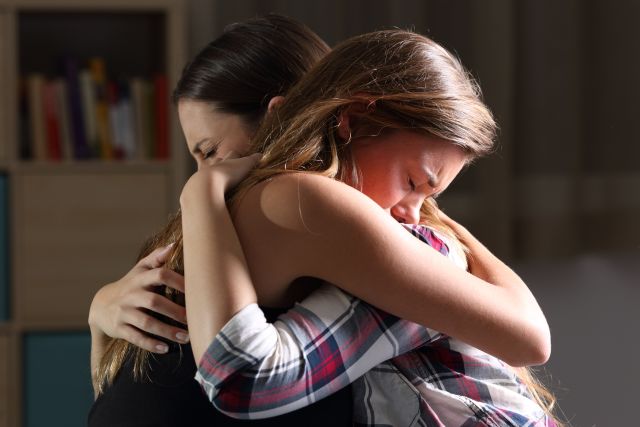Updated on September 5, 2024.
In recent years, life has been disrupted by a steady string of tragedies, including mass shootings, terrorist attacks, war, natural disasters, and other events that have claimed countless innocent lives. Confronting catastrophe and constantly trying to make sense of the senseless can make the world seem like a dark, hopeless, and dangerous place.
Each tragedy forces people to react and cope in their own way. Facing a life-threatening or extremely stressful situation can trigger the production of stress hormones and a cascade of physical changes in the body. The heart may pound, breathing may speed up, muscles can become tense, and sweating may intensify. This is often called the “fight or flight” response, which has evolved to help people face or escape dire threats. In some cases, people may have the opposite response and “freeze,” feeling unable to move or respond.
As details of traumatic events unfold, a wide range of variables can affect how people respond. These include their own previous experiences, their closeness to the incident, their age and life skills, and their level of community or family support.
Different people may have divergent thoughts, feelings, and reactions. Many will ask questions in an attempt to understand what has happened: Why did this happen? Could it have been prevented? What should I have done to help?
Answers may not always be clear or easy to find. Shootings and other incidents of mass violence or destruction can destabilize one's sense of safety and order, even if the event occurred thousands of miles away and affected people you’ve never met. Tragedies can challenge basic assumptions we often hold about the world—that things happen in a fair or predictable way, that we have control over our lives, and that people are inherently good and trustworthy.
How traumatic events may affect the body and mind
The unpredictability of tragic events can be particularly distressing and can trigger a range of reactions that affect our bodies, minds, and behavior. Some of the physical symptoms that may appear include:
- Loss of energy or fatigue
- Headaches
- Nausea or vomiting
- Tightness in the chest
- Rapid heart rate
- Grinding of teeth
- Dry mouth or thirst
- Feeling shaky or weak
- Severe sweating
- Stomach pain or digestive problems
Tragedy can also trigger a wide range of emotions and some changes in mental well-being. These may include:
- Intense anxiety
- Sadness or anger
- Feeling numb, hopeless, or powerless
- Excessive worry or unexplained guilt
- Feeling agitated or unable to relax
- Moodiness or irritability
- Trouble concentrating
- Ruminating or having flashbacks of the tragic event
Behavioral changes can also occur among those who’ve experienced traumatic events, including:
- Nightmares or disrupted sleep
- Becoming socially isolated
- Frequent crying or outbursts
- Changes in appetite or eating patterns
- Avoidance of certain places or people that resurface difficult memories or negative reactions
- Heavy smoking, drinking, or drug use
Children and teens may respond to trauma differently than adults. Young children may regress and do things they’ve apparently outgrown, like bed-wetting, forgetting how to walk or talk, or clinging to their caregivers. Older kids and teens may respond more like adults but also develop disruptive behaviors, such as acting disrespectfully or destructively.
How to regain some sense of control
People’s physical and mental reactions to tragic events may happen right away or take months—possibly years—to appear. In most cases, they lessen and become more tolerable over time. For some people, however, traumatic experiences can have lasting negative effects. When exposure to trauma or tragedy interferes with your daily life, it’s time to seek help from a trained healthcare professional.
Some other ways to help cope with tragic events include the following:
Seek support from friends and loved ones
Connecting with others and sharing your thoughts and concerns can help you process your feelings and cope with adversity. Joining a support group of people who are also working through loss or trauma could provide comfort and help you feel less isolated.
Try to maintain your normal routine
It may seem difficult, but going through the motions—eating, sleeping, and exercising as usual—can help you restore some sense of order. It can also help ensure you’re getting the nutrition, sleep, and movement you need to stay healthy and support others who need you.
Reach out to help others
Find ways to help others in your community or those affected by the tragedy. Assisting others can not only help alleviate their suffering but help you cope with the events, as well.
Avoid alcohol and other substances
It may be tempting to seek solace by numbing the pain. Fear and anxiety can trigger strong emotions but using substances to cope can do more harm than good and worsen feelings of depression and anxiety. Do not smoke, drink, or take drugs to cope with difficult circumstances or feelings.
Have compassion for yourself—and empathy for others
Allow yourself to experience your thoughts and feelings. Even if you are not directly affected by tragic events, your reaction to them is valid. Talk about how you are feeling with people you trust. Similarly, allow others to express themselves without judgment.
Be mindful of the specific needs of children
Allow young people to ask questions. Respond to them in a way they can understand. Provide information in small, age-appropriate doses. Limit television viewing or live-streaming of troubling events in areas where children may be present or able to see or hear what is happening.
Similarly, be aware of conversations surrounding tragic events. Avoid talking about them in front of children or even teenagers to limit their exposure to details and commentary that they may not understand.
It’s also important to be aware that kids may receive misinformation or misinterpret facts from their friends and classmates. Try to reassure kids by teaching them how to protect themselves, giving hugs or physical contact when they need it, and making plans to do things together.
Remember that grief is a process that takes time
Healing doesn’t always follow a linear path. Grief can take time to subside and it may come in waves that surge and recede at various times. Some people may be able to compartmentalize their loss and move forward in a matter of months. For others, this process could take years.






